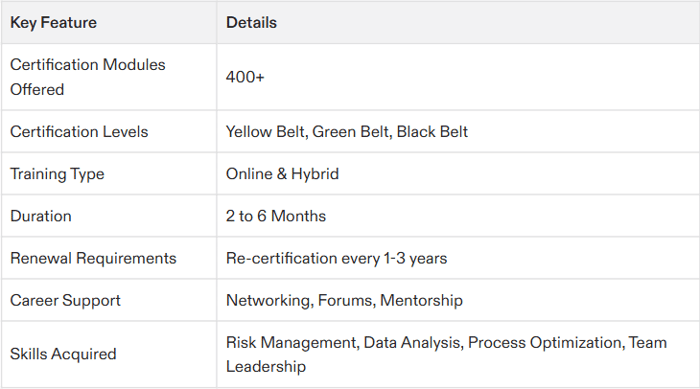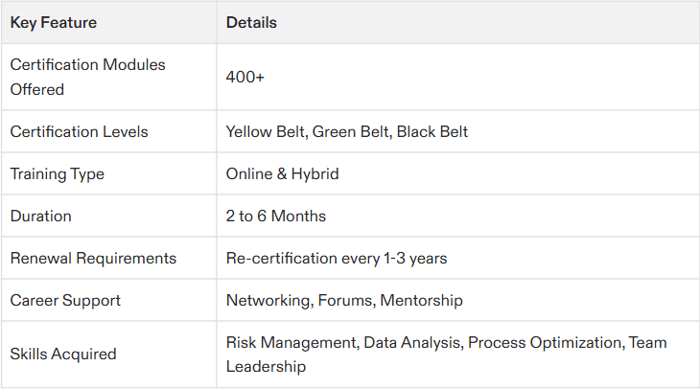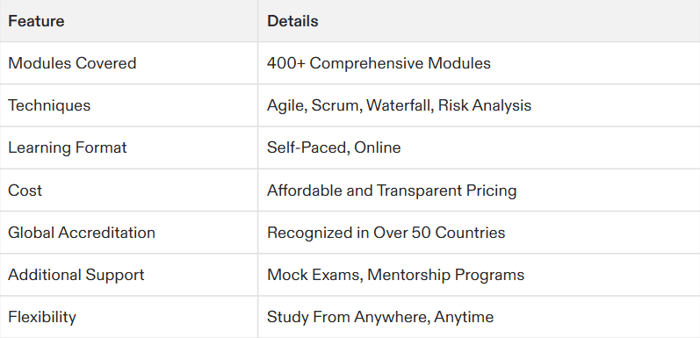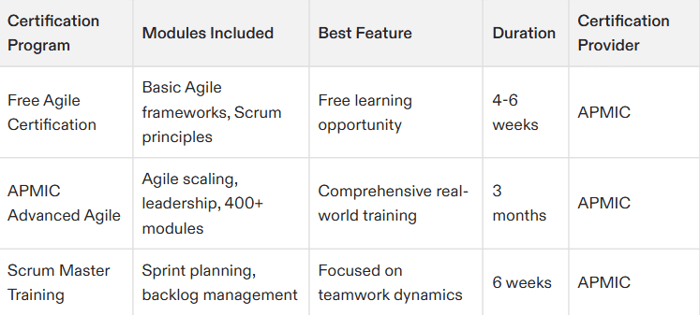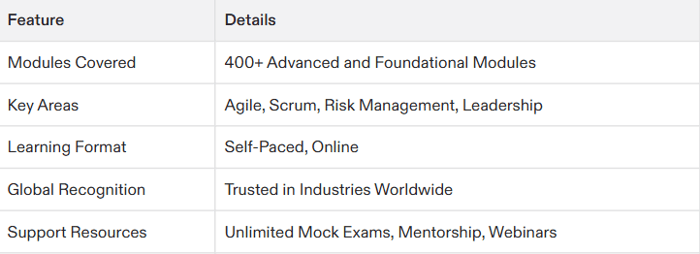Table of Contents
- Introduction to Six Sigma Project Management Certification
- Why is Six Sigma Project Management Certification Important?
- Who Should Get Certified?
- What Will You Learn?
- How to Earn the Six Sigma Project Management Certification?
- Advantages of Six Sigma Project Management Certification
- Common Challenges and How to Overcome Them
- FAQs About Six Sigma Project Management Certification
- 1. What is the cost of the certification?
- 2. How long does it take to earn the certification?
- 3. Do I need prior experience in project management?
- 4. Is the certification renewable?
- 5. What industries value this certification?
- 6. Can I take online courses to prepare for the certification?
- 7. What skills will I gain?
- 8. How is it different from traditional project management certifications?
- 9. What is the format of the certification exam?
- 10. How does Six Sigma certification shape career growth?
- Table: APMIC Certification Highlights
- Final Thoughts
Introduction to Six Sigma Project Management Certification
Six Sigma Project Management Certification combines the power of Lean methodologies and Six Sigma principles to optimize project management processes. With its focus on data-driven decision-making, process optimization, and waste reduction, this certification program has become a sought-after credential for professionals aiming to improve operational efficiency and drive business success. Whether you're in IT, manufacturing, finance, healthcare, or other industries, acquiring the Six Sigma Project Management Certification equips you with the tools to streamline workflows and achieve consistent outcomes.
Why is Six Sigma Project Management Certification Important?
The modern business environment is rife with challenges like tight deadlines, limited resources, and increasing competition. Here's how Six Sigma Project Management Certification can help address these challenges:
Improve Process Efficiency
By relying on Six Sigma principles, project managers learn how to minimize errors, eliminate waste, and enhance productivity across projects.Enhance Decision-Making Skills
Data-driven techniques taught in the Six Sigma approach enable managers to make informed decisions that lead to better project outcomes.Increase Career Opportunities
Industries worldwide value the Six Sigma skillset because it directly impacts an organization's profitability, making certified professionals high in demand.Boost Team Collaboration
The structured methodologies of Six Sigma promote teamwork, collaboration, and consistent best practices, leading to improved project success rates.
If you're targeting a career defining moment, pursuing Six Sigma Project Management Certification is a smart investment.
Who Should Get Certified?
If you're an aspiring or experienced project manager, operations manager, or team lead looking to improve your expertise, this certification is perfect for you. Professionals working across industries such as IT, finance, manufacturing, and healthcare can benefit significantly from the knowledge imparted in a Six Sigma Project Management Certification course.
What Will You Learn?
Here’s a snapshot of what Six Sigma Project Management Certification typically covers:
- Defining Goals – Understand project objectives and stakeholder expectations.
- Measuring Performance – Learn to gather accurate data for improving processes.
- Analyzing Processes – Identify issues that hinder optimal performance.
- Improving Efficiency – Apply Lean and Six Sigma strategies to address inefficiencies.
- Controlling Outcomes – Maintain process improvements while ensuring sustainability.
Programs like the comprehensive modules offered by APMIC teach 400+ skills, ensuring you gain a deep grasp of project management tools and methodologies.
How to Earn the Six Sigma Project Management Certification?
Choose the Right Certification Level
Six Sigma certifications are available in multiple levels, including Yellow Belt (beginner), Green Belt (intermediate), and Black Belt (advanced). Select the level that aligns with your career aspirations.Enroll in a Reputable Training Program
Institutes like APMIC provide robust training programs, covering all Six Sigma essentials with practical applications.Complete Your Training
Whether online or in-person, attend all sessions and participate in exercises designed to reinforce learning.Pass the Certification Exam
The certification exam typically involves case studies, problem-solving tasks, and multiple-choice questions to assess your understanding.Apply Your Knowledge
Use your newfound expertise to lead projects, eliminate inefficiencies, and drive measurable results.
Advantages of Six Sigma Project Management Certification
Obtaining this certification not only enhances your skills but also sets you apart in a competitive job market. Here's what you stand to gain:
Higher Earning Potential
Certified professionals often command higher salaries compared to their uncertified counterparts.Global Recognition
Six Sigma certifications are widely acknowledged, making you a credible project management expert anywhere in the world.Scalable Skillset
The skills learned can be applied to various project sizes and industries, ensuring versatility.Enhanced Credibility
Adding Six Sigma expertise to your resume demonstrates commitment to quality and performance excellence.
Common Challenges and How to Overcome Them
While the benefits are immense, obtaining the Six Sigma Project Management Certification has its challenges. Here are some tips to tackle them effectively:
- Time Constraints – Create a clear study schedule and stick to it.
- Complex Concepts – Focus on grasping Lean and statistical tools through practical examples.
- Exam Preparation – Take advantage of practice tests offered in your training program to build confidence.
FAQs About Six Sigma Project Management Certification
1. What is the cost of the certification?
Certification programs typically range from $500 to $5000, depending on the level (Yellow, Green, Black Belt) and training provider.
2. How long does it take to earn the certification?
Most courses take around 2-6 months, depending on the depth of the content and your personal learning pace.
3. Do I need prior experience in project management?
Though experience is beneficial, several courses, including beginner-focused programs, cater to individuals without prior knowledge.
4. Is the certification renewable?
Yes, many certifying bodies have renewal requirements, often involving continuing education or re-certification exams.
5. What industries value this certification?
Industries such as IT, healthcare, manufacturing, and finance highly value certified professionals for their ability to improve workflows and boost profitability.
6. Can I take online courses to prepare for the certification?
Absolutely! Platforms like APMIC offer comprehensive online training that provides the flexibility to learn at your pace.
7. What skills will I gain?
The certification equips you with skills in process optimization, statistical analysis, team collaboration, and data-driven decision-making.
8. How is it different from traditional project management certifications?
Unlike traditional certifications, Six Sigma focuses heavily on process improvement, waste elimination, and quality control, adding operational effectiveness to core project management skills.
9. What is the format of the certification exam?
The exam generally includes multiple-choice questions, practical problem-solving tasks, and case studies.
10. How does Six Sigma certification shape career growth?
The credential enhances your professional credibility and opens doors to leadership roles in various industries.
Table: APMIC Certification Highlights
Become a true expert in Six Sigma methodologies with the comprehensive training provided by APMIC.
Final Thoughts
Investing in the Six Sigma Project Management Certification is one of the most strategic steps professionals can take to revolutionize their careers. Through tools that emphasize process improvement, waste elimination, and data-driven decision-making, this certification ensures that you're not just managing projects but enhancing their outcomes. With trusted platforms like APMIC offering over 400 modules to prepare you for success, now is the ideal time to take the leap.

